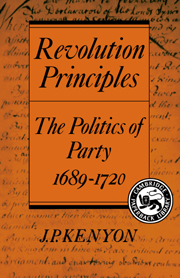Book contents
- Frontmatter
- Contents
- Preface
- Preface to the paperback edition (1990)
- 1 Introduction
- 2 By force or by miracle
- 3 The measure of submission
- 4 This skein of tangled principles
- 5 King Charles's head
- 6 The bloody flag
- 7 Revolution Principles
- 8 Black and odious colours
- 9 The four last years
- 10 That triumphant appellation
- 11 Conclusion
- Appendix
- Abbreviations
- Notes
- Addendum
- Index
9 - The four last years
Whiggism on the defensive
Published online by Cambridge University Press: 07 October 2009
- Frontmatter
- Contents
- Preface
- Preface to the paperback edition (1990)
- 1 Introduction
- 2 By force or by miracle
- 3 The measure of submission
- 4 This skein of tangled principles
- 5 King Charles's head
- 6 The bloody flag
- 7 Revolution Principles
- 8 Black and odious colours
- 9 The four last years
- 10 That triumphant appellation
- 11 Conclusion
- Appendix
- Abbreviations
- Notes
- Addendum
- Index
Summary
In the last four years of Anne's reign it seemed that the Whigs had shot their bolt. They had failed to establish their political orthodoxy; indeed, Sacheverell's trial had tarred them even more indelibly with the brush of republicanism and irreligion. Nor had the verdict given ‘a lasting sanction to the Revolution’, as they tried to insist; they had been pinned back to the wretched ‘abdication’ compromise of 1689, and forced to admit that it had been a once-for-all-time event. This would only make it the more difficult to employ similar techniques on Anne's death, if it were then a case of resisting James III – whose hereditary title they had themselves confirmed.
Moreover, they had signally failed to clinch the question of Anne's own title, whether it was hereditary or parliamentary or both, though this had been the subject of debate for most of her reign, and at least one passage in Sacheverell's sermon gave them the opportunity to incorporate it in the articles of his impeachment if they wished. Inevitably, the question arose at the trial, and the Whigs themselves seemed far from unanimous on the matter. Sir John Hawles argued that Anne had a stronger title than King William because hers was hereditary as well as parliamentary, but there was no reason, he said, why the exact proportion between these two elements should be defined, and the one need not exclude the other. He accused Sacheverell of advising her ‘to quit that title she claims from her people, and to rely upon her title by inheritance’.
- Type
- Chapter
- Information
- Revolution PrinciplesThe Politics of Party 1689–1720, pp. 146 - 169Publisher: Cambridge University PressPrint publication year: 1977

